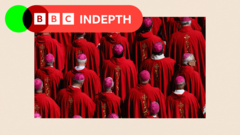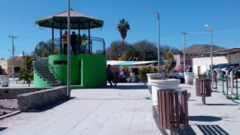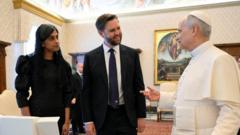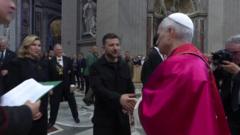The upcoming conclave, influenced heavily by Pope Francis's 12-year tenure, showcases a diverse group of cardinals grappling with the church's varying global needs. While many aim for continuity with Francis's reforms focused on social issues, others remain skeptical, leading to a pivotal moment in the Catholic Church's future direction.
Turbulent Times in the Vatican: Conclave Dynamics Post-Pope Francis

Turbulent Times in the Vatican: Conclave Dynamics Post-Pope Francis
As cardinals prepare to elect a new Pope, the divergent views within the Vatican highlight the complex legacy of Pope Francis.
As the cardinals gear up for the conclave beginning on May 7 at the Vatican's Santa Marta guesthouse, they find themselves in a unique setting marked by both anticipation and division. One of the guesthouse's rooms remains sealed with a red ribbon, a poignant reminder of the late Pope Francis whose impactful leadership has shaped this pivotal moment. Over his 12 years in office, Pope Francis appointed about 80% of the participating cardinals, embedding his vision deeply into the Church's leadership.
In the wake of his passing, discussions among the cardinals reveal a complexity of opinions regarding the future direction of the Church. Francis’s efforts to democratize Church governance and address social issues have create a contrast between the needs of the global Catholic community and the realities faced in various regions. While some cardinals advocate for continuity with Francis's reforms, particularly those emphasizing the Church's outreach to the marginalized, skepticism lingers amongst his critics who fear the dilution of traditional doctrines.
During the pre-conclave general congregations, all 252 cardinals were invited to share their perspectives on the Church's needs and direction. Opinions differed based on regional experiences; for example, European cardinals highlighted the urgency of revitalizing interest in Church doctrines amid declining congregations, while their counterparts from Africa and Asia concentrated on pressing social challenges such as poverty and conflict.
This conclave is historically the most diverse, with representation from countries such as South Sudan and Rwanda joining the discussions for the first time. Cardinals are not only tasked with electing a new Pope but also reconciling the various visions and challenges facing the Church. The new spiritual leader will inherit both the mantle of religious authority and expectations as a statesman in addressing global issues.
The role’s titles—Bishop of Rome, Vicar of Christ, Sovereign of Vatican City—underscore its depth, marking the Pope as much more than a religious figure but a global influencer. Francis’s voice resonated far beyond Catholic circles, appealing to universal themes of dignity, peace, and environmental stewardship. His critics, however, assert that his approach has sometimes strayed from traditional teachings, raising questions about the Church’s governance moving forward.
Recognizing the diverse challenges faced, cardinals anticipate a leader who will respond to the Church's multifaceted reality—balancing tradition with innovation while heeding the pleas of both the faithful and those outside the Church’s confines. As they prepare to convene in the Sistine Chapel, driven by differing philosophies but united in purpose, they will ultimately seek the guidance of the Holy Spirit in this vital decision for the Church's future.




















